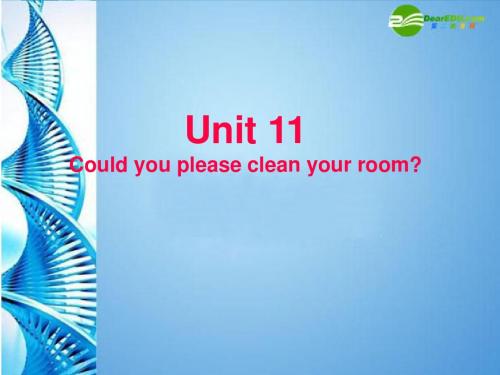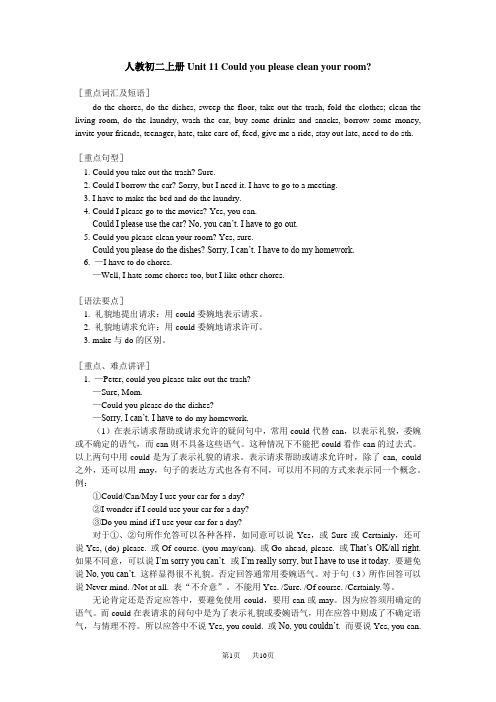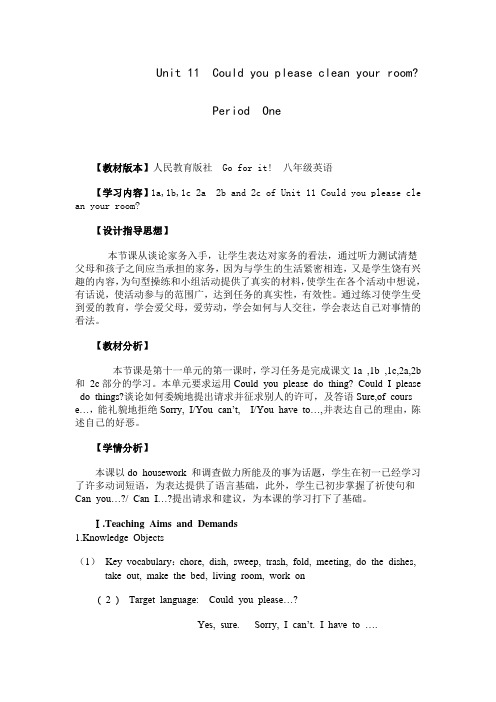Unit 11 Could you please clean your room
- 格式:ppt
- 大小:209.50 KB
- 文档页数:25


•••••••••••••••••Unit 11 Could you please clean yourUnit 11 Could you please clean your room?说课稿作为一位无私奉献的人民教师,可能需要进行说课稿编写工作,借助说课稿我们可以快速提升自己的教学能力。
那么你有了解过说课稿吗?下面是小编为大家收集的Unit 11 Could you please clean your room?说课稿,欢迎阅读与收藏。
一.说教材1.本单元的主要语言功能是礼貌地请求别人做某事和向他人请求允许做某事,语法项目是Could you please do…?和Could I do …?整单元分四课时完成。
本节课是本单元的SECTION A部分的第一课时。
从教材的整合来说它是Can you do…?(表请求)和Can I do …?(请求许可)的延续,只是表达更委婉,更有礼貌。
从本单元来说,它既是本单元的基本语言内容,又为本单元知识扩展和综合语言运用奠定坚实的基础。
至于学生,八年级的学生在之前已学过Can you do…? Can I do …?句型,还掌握了一定的动词短语如do some washing, clean the floor…等,而且本单元话题又贴近他们的生活,应该会有话可讲,有话要讲。
2.基于以上的教材以及学生的分析,本节课教学要达到以下几个目标:A.语言知识目标:通过本节课的学习,学生要掌握chore等8个词汇以及词组的运用。
B.语言技能目标:让学生学会用所学词汇和句型委婉地向他人表示请求或要求许可。
C.学习策略目标:让学生掌握在听力前进行预测或浏览关键词的策略,还有对单词的直拼策略,以及学会与同学之间的交际策略。
D.情感技能目标:1)让学生学会为家长分担家务,做一个好儿子或好女儿。
2)对他人提出请求或请求许可时要有礼貌。
E.文化意识目标:通过这节课,让学生对英美国家青少年如何向家长提出请求和请求许可有所了解,培养世界意识。

Unit 11 could you please clean your room?一.Grammar focusCould you please clean your room?请你打扫一下你的房间好吗?Yes, sure.可以,没问题。
Could you please do the dishes?请你清洗一下餐具好吗?Sorry, I can’t have to do my homework.对不起,不行。
我得做家庭作业。
Could I please go to the moives?我可以去看电影吗?Yes, you can.是的,你可以。
Could I please use the car.我可以用一下你的车吗?No, you can’t. I have to go out.不,你不能。
我必须得出去。
Could 的用法1)本单元的语法主要涉及用来表示请求常交际用语Could you please do sth…..?Could I please do sth…..?2)could 并非表示过去,只是语气上比can更委婉Limei, could you please help me?Could I please come in?3)对于请求肯定回答常用语Certainly /of course/with pleasure/no problem/yes, sure4)否定回答时常用语:No, can’t/certainly not/no, I’m afraid I can’t.三.Key sentence1.peter,could you please take out the trash?Take outTake part take off take down take lessons take walksTake a vacation take care of take the subway2.i have to go to a meeting.Have to must区别have to 强调客观原因,用助动词进行各句式转换;回答时用助动词must 强调主观原因,must 是情态动词,通过自身的改变进行句式的转换;回答时用must 或needn’t。

Unit11Couldyoupleasecleanyourroom 八年级英语教案unit 11 could you please clean your room ?i. teaching aims and teaching demands:in this unit students learn to make polite requests and ask for permission .ii. teaching key and difficult points:a. vocabularydo the chores, do the dishes ,sweep the floor, take out the trash, fold the clothes, clean the living room , do the laundry, wash the car,buy some drinks and snacks, borrow some money, invite your friends teenager, hate, take care of , feedrecycling: make the bed, say out late, use the car ,get a ride, cook, clean, fun, boring, relaxing, cd playerb. target languagecould you take out the trash? sure.could i borrow the car?sorry, but i need it . i have to go to a meeting.i have to make the bed and do the laundry.c. structurescould for a polite requestcould for permissionmake versus doiii. teaching methods: audio-lingual methods and pppiv. teaching aids: a tape recorderv. this unit is divided into five periods.period ii. teaching aims and demands:students learn to make polite requests and ask for permission.ii. teaching key and difficult points:a. vocabularydo the dishes , sweep the floor, take out the trash, make your bed, fold your clothes, clean the living room, make the bedb. target languagecould you sweep the floor ? yes , sure.iii. teaching methods: audio-lingual methods and pppiv. teaching aids: a tape recorderv. teaching procedurestep 1. revisionsay to the students, i want to borrow a pen. what can i do ? please give me your pen. pass your pen to me, please.say ,there is another way polite way to ask for something.write could you please give me your pen? on the board.repeat the question.i am going to go home .ok?→ could i go home now? (more polite) can i borrow your bike? → could i borrow your bike?can i use your dictionary?step 2. presentationthis activity reviews earlier vocabulary and introduce some new words.task 1 . point to the items under the heading chores in the chart .ask the students what the chores means.(a chore is a job you do at home.)then point to the items again and read each one to the class .ask the students to explain the each chore in their own words and say if they do it or not. for example , a student might say, after we eat breakfast the dishes are dirty. we have to do the dishes. do the dishes is the same as wash the dishes.task 2. then read the instructions.task 3. ask the students to find a partner.八年级英语教案read and repeat the phrases.step 3. understanding the target language in spoken conversation.task 1. read the instructions.task 2. play the recording the first time. students only listen.task 3. play the recording a second time. and fill in the chart. then check the answers.step4. pairworkask the students to look at the picture above and ask your partner to do the chores that you see.homework1. make up your own conversations.2. make six sentences with the target language.period ⅱi. teaching aims and demands :students learn to make polite requests and ask for permission.ii. teaching key and difficult points:a. vocabularystay out late, use the car, get a ride, go to a meeting, clean your room,b. target languagecould you please clean your room? yes, sure.could i please use the car? no, you can’t. i have to go out.could i please go to the movies? yes, you can.could i borrow the car?sorry, but i need it . i have to go to a meeting.i have to make the bed and do chores.iii. teaching methods: audio-lingual methods and pppiv. teaching aids: a tape recorderv.teaching procedurestep 1. revisiontask1. check the homework. ask and answer.task2.revise the vocabulary.step 2. listening and understandingtask1.read the instructions. learn the key vocabulary.stay out late, use the car, get a ride, go to a meeting, clean your room,read and repeat the phrases.task2.this conversation is between peter and his father. listen and fill in the chart with yes and no.then check the answers.step 3.listeninglisten carefully and find out why peter’s father says ‘no”. draw lines to the reasons in the chart above.step 4. pairworkaccording the sample conversation , ask and answer in pairs.then ssk and answer in pairs in class.step 5. grammar focuscould you please clean your room? yes, sure.could you please do the dishes? sorry, i can’t. i have to do my homework.could i please use the car? no, you can’t. i have to go out.could i please go to the movies? yes, you can.pay attention to the questions and answers, ask and answer loudly.homework1. review the conversation and the vocabulary.2. write your own conversations on making permission. .period ⅲi. teaching aims and demands :students learn to make polite requests and ask for permission. ii. teaching key and difficult points:a. vocabulary。

人教初二上册Unit 11 Could you please clean your room?[重点词汇及短语]do the chores, do the dishes, sweep the floor, take out the trash, fold the clothes; clean the living room, do the laundry, wash the car, buy some drinks and snacks, borrow some money, invite your friends, teenager, hate, take care of, feed, give me a ride, stay out late, need to do sth.[重点句型]1. Could you take out the trash? Sure.2. Could I borrow the car? Sorry, but I need it. I have to go to a meeting.3. I have to make the bed and do the laundry.4. Could I please go to the movies? Yes, you can.Could I please use the car? No, you can’t. I have to go out.5. Could you please clean your room? Yes, sure.Could you please do the dishes? Sorry, I can’t. I have to do my homework.6. —I have to do chores.—Well, I hate some chores too, but I like other chores.[语法要点]1. 礼貌地提出请求:用could委婉地表示请求。

Unit 11 Could you please clean your room?Period One【教材版本】人民教育版社 Go for it! 八年级英语【学习内容】1a,1b,1c 2a 2b and 2c of Unit 11 Could you please cle an your room?【设计指导思想】本节课从谈论家务入手,让学生表达对家务的看法,通过听力测试清楚父母和孩子之间应当承担的家务,因为与学生的生活紧密相连,又是学生饶有兴趣的内容,为句型操练和小组活动提供了真实的材料,使学生在各个活动中想说,有话说,使活动参与的范围广,达到任务的真实性,有效性。
通过练习使学生受到爱的教育,学会爱父母,爱劳动,学会如何与人交往,学会表达自己对事情的看法。
【教材分析】本节课是第十一单元的第一课时,学习任务是完成课文1a ,1b ,1c,2a,2b 和2c部分的学习。
本单元要求运用Could you please do thing? Could I please do things?谈论如何委婉地提出请求并征求别人的许可,及答语Sure,of cours e…,能礼貌地拒绝Sorry, I/You can’t, I/You have to…,并表达自己的理由,陈述自己的好恶。
【学情分析】本课以do housework 和调查做力所能及的事为话题,学生在初一已经学习了许多动词短语,为表达提供了语言基础,此外,学生已初步掌握了祈使句和Can you…?/ Can I…?提出请求和建议,为本课的学习打下了基础。
Ⅰ.Teaching Aims and Demands1.Knowledge Objects(1)Key vocabulary:chore, dish, sweep, trash, fold, meeting, do the dishes, take out, make the bed, living room, work on( 2 ) Target language: Could you please…?Yes, sure. Sorry, I can’t. I have to ….Could I please …?Yes, you can. No, you can’t. You must….2.Ability Objects(1) Learn to make polite requests and ask for permission.(2) Train the lisrening skill with the target language.3.Moral ObjectsKnow the polite ways to ask for permissions.Ⅱ.Teaching Key Points1 Learn the new words and useful expression.2 Master the target language.Ⅲ.Teaching Difficult Points1.Make polite requests and ask for permission.2.Practice in pair using the target language.Ⅳ.Teapching MethodsListening , Pairwork, GroupworkⅤ.Teaching AidsRecorder, tape, pictures, small blackboard, broom, dishes, clothes Ⅵ.Teaching ProceduresStep One RevisionCan you …? Can I …?Yes, I can../ No, I can’t. Yes, you c an. / No, you can’t.Step Two Lead-inSay to a student, give me your pen. Accept the pen an d then give it back to the student.T: There is another polite way to ask for something. It means the same as please give me your pen. Could you ple ase give me your pen? In this unit we are going to learn ho w to use Could I please … to ask permission to do somethin g.Step Three Learn new words and phrasesWhat kind of chores can you find in the picture? Do y ou do these chores at home? Discuss with your partner.Step Four PairworkWork with a partner. Ask each other to do the chores. First one student asks all the questions and the other stu dent answers. Then the other student asks all the question s.Step Five ListeningListen to the recording and check Peter’s mother or Peter.Check the answers.Step Six Make a surveyDiscuss in group of four.Draw a smiling face on the chore you like, and drawin g a crying face on the chore you dislike.Then give a report.ChoresLikeDon’t likedo the dishessweep the floortake out the trashmake the bedfold the clothesclean the living roomStep Seven ListeningRead the instructions to the class.Listen to the tape for the first time. Ask students t o check yes if Peter’s father says yes or no if Peter’s f ather says no.Play the recording again. Ask them to draw a line bet ween each no answer and the correct reason.Check the answers.Step Eight GameAsk students to work in groups of 4. Help students fo rm their groups. Then give each group a set of black cards. Ask the students in each group to copy each phrase onto a card. The first srudent turns over a card, and asks the per son next to him or her to do this chore. That person needs to say ”no” and give a reason or excuse.This is a good way to help students practice new sent ence forms.Step Nine HomeworkMake a convacation between you and your parent abour doing the chores.【板书设计】【教学反思】通过本课的学习,绝大多数学生都掌握了Could you … ? Could I … ?句型及其肯定和否定回答,在练习巩固的过程中理解了父母,学会了与他人沟通,这也是素质教育与人为本的目标体现,不足之处在于部分学生在作否定回答给出理由时比较困难,这也暴露出他们对常用短语的不熟悉,灵活运用程度还有待提高。
初二英语Unit 11 Could you please clean your room? 人教版【本讲教育信息】一. 教学内容:Unit 11 Could you please clean your room? 讲二. 语言目标:Make polite requests; Ask for permission三. 目标语言:-- Could you please sweep the floor? -- Yes, sure.四. 重、难点诠释:1. Could you please +原V ? 请你……好吗?表达一种礼貌的、委婉的请求。
其中could 是客气的表达方式,不是过去式,所以回答时不能用Yes, I could 。
可以用Yes, I can / Sure / No problem 、I ’d love to. / Of course. / OK 等回答。
否定回答则用Sorry, I can ’t 或I ’d love to, but …,并陈述理由。
ex:-- Could you please sweep the floor? -- Sure.2. Could I please …? 是用来询问对方,征求对方的许可,意思是“我做……可以吗?”其中的could 也是较客气的说法,可用can 或may 代替。
ex: --Could I use your puter? -- Yes, you can / may. Sorry, you _____________.-- _______ you give your notebook to me? -- Sorry, I ’m using it. 3.⎪⎪⎪⎩⎪⎪⎪⎨⎧?____________________?____________________?_______________________?____________________?____________________please you Could (打扫卫生)(做饭)(做家务)(洗衣服)(洗餐具)4. take out the trash 倒垃圾take out 是动副结构的短语,若宾语是代词,则置于两词中间。
八年级英语Unit 11 Could you please clean your room【单元话题】1. 学习向别人提出请求的礼貌语言.2. 学习如何争得别人的允许或许可.3. 能写出一篇短信, 要求你的朋友或家人当你不在时为你所做的事情.【重要句型概览】1. Could you please clean your room?Yes, sure.2. Could you please do the dishes?Sorry, I c an’t. I have to do my homework.3. Could I please go to the movies?Yes, you can.4. Could I please use the car?No, you can’t. I have to go out.【重要词组概览】do the dishessweep the floortake out the trashfold your clothesclean the living roomdo choresget a ridehave to do sth.forget to do sth.do the laundryhate to do (doing) sth.like to do (doing) sth.make dinnermake your bedinvite sb to a placetake sb. for a walkplay with sb.give sb sth.=give sth to sbtake care of= look after【语法聚焦】表示请求、允许、许可表示允许时用can, could, may, might表达。
它们没有时态上的差别,只是could比can, might 比may语气上要客气。
(用can或could表示“许可”,虽然很普通,但在正式、庄重的场合用may。
新目标八年级英语上册Unit 11 Could you please clean your room?讲解与练习姓名班级【重要词组概览】do the dishes洗餐具sweep the floor扫地take out the trash倒垃fold your clothes叠衣服clean the living room打扫起室do chores处理琐事,干家务do the laundry洗衣服make the bed整理床铺,铺床get a ride搭车【重点讲解】1.Could you please take out the trash?请把垃圾倒掉好吗?Could you please+动词原形?意为“请你做……好吗?”表示说话人非常有礼貌,语气非常温和。
答语可以用Yes./Sure./Yes,I can./Ceartainly.等。
如:——Could you please open the window? ——Sure.2.I hate to do chores.我不喜欢做家务。
hate to do sth. 或hate doing sth.表示“厌恶做某事”如:I enjoy cooking but hate washing dishes.我喜欢做饭,但是我不喜欢洗盘子。
I like swimming but I hate to swim today.我喜欢游泳,但今天我讨厌游泳。
3.Could I invite my friends to a party?我能请我的朋友参加聚会吗?invit 邀请,其名词形式是invitation.(1).invite sb.+地点邀请某人到某地。
如:invite Jenny to my house.邀请詹妮到我家。
(2).invite sb.to do sth. 邀请某人做某事。
如:We invite them to dance.我们邀请他们跳舞。
Unit11Couldyoupleasecleanyourroom? 听力部分(共20分)I. 听对话,选择与其相符的图片(略)II. 听句子,选择最佳答语(5分)( )6. A. It’s cute. B. Don’t say that. C. You’re welcome.( )7. A. Yes, I do.B. Thank you. C. No, it’s interesting. ( )8. A. Why? B. Yes, sure. C. You can do it.( )9. A. I think so, too. B. Do you like it? C. I’m sorry to hear that.( )10. A. You’d better not. B. Yes, you can. C. Yes, I have to use it. III. 听对话及后面的问题,选择正确答案(5分)( )11. A. Watch TV. B. Go out. C. Have a test.( )12. A. To the bank.B. To the supermarket. C. To the post office.( )13. A. Twice a day. B. Three times a day. C. Four times a day.( )14. A. Cooking.B. Cleaning the car. C. Sweeping the floor. ( )15. A. She is tired.B. She is busy. C. She doesn’t have any money. IV. 听短文,判断正(T)误(F)(5分) ( )16. The story happened (发生) in the afternoon.( )17. John’s mother asked him to do some chores.( )18. John was happy to feed the chickens.( )19. John kicked (踢) the cow.( )20. John got eggs and milk at last. 笔试部分(共80分) I. 单项选择(15分) ( )21. —Jet, could you come to the living room, please? Come to help me!—________________.A. OK. I’m comingB. Have funC. It doesn’t matterD. Sorry to hear that( )22. Many teenagers like ________ very much, but they are not good for their health.A. playersB. choresC. trashD. snacks( )23. Could you _______ the floor? It is dirty.A. makeB. sweepC. foldD. invite( )24. —Could you come to my house for dinner this Saturday?—I’m sorry, _________ I have to go to a meeting.A. andB. butC. althoughD. so( )25. —Do you often do chores at home?—Yes. I think they’re __________, but I have to help my mum.A. interestingB. relaxingC. boringD. fun( )26. —Could I use your computer, Dad?—Sorry, you ____________. I’m going to work on it.A. would n’tB. can’tC. needn’tD. don’t have to( )27. —Could you please not put the trash here?—________. I’m taking it away.A. Yes, I couldB. Of course notC. Sorry, I won’tD. Sorry, I can’t( )28. Thanks for ________ care of my dog when I was away.A. takeB. tookC. takingD. takes( )29. Your umbrella is much bigger than _____.A. IB. meC. myD. mine( )30. —Can I watch TV this afternoon, Mum?—Yes, but ______ you have to finish your homework.A. firstB. onceC. againD. ever( )31. I _________ to a new house next weekend. I need your help.A. movedB. moveC. was movingD. am going to move ( )32. My dad tells me not to ________ too late in the evening. He says it is dangerous.A. come overB. grow upC. stay outD. get up( )33. —Could you buy us _________ drinks?—Sorry, I don’t have _____ money.A. any; anyB. any; someC. some; someD. some; any ( )34. —Are you ______ now, Dave? I’m visiting you. —Sorry, I’m _______ vacation with my mother.A. in; inB. in; onC. on; onD. on; in( )35. Rose _______ some money _____ Toby because she wants to buy a computer.A. gave; toB. helped; withC. asked; forD. borrowed; from II. 完形填空(10分) Lisa is serious about the chores in her house. She gives her children things that they36 do according to their age. She started by asking John, the37 of her two sons, to help with the dishes. It is now an easy chore 38 the 15-year-old. His 13-year-old brother, Dave, now 39 John too. They take turns (轮流) washing the 40 each week. The boys also clean their study tables, make their beds and 41 food from the market on Sunday mornings. Besides (除了) these, the boys also know how to cook easy meals 42 their parents are not at home. The family of 43 live in a big house but they do all the housework themselves. Lisa says, "When I was young, my father wanted us to do things on our own (独立地) and learn how to 44 ourselves. Now I’m doing it to my kids."John says, "Doing chores is 45 . You learn important life skills and responsibility (责任)."( )36. A. musB. can C. mayD. will( )37. A. elder B. taller C. younger D. shorter( )38. A. with B. as C. forD. by( )39. A. likesB. finds C. hatesD. helps( )40. A. handsB. dishesC. fruitD. clothes( )41. A. borrow B. cook C. buy D. sell( )42. A. when B. how C. what D. why( )43. A. two B. three C. four D. five( )44. A. work on B. take part in C. turn on D. take care of ( )45. A. bad B. good C. difficult D. boring III. 阅读理解(20分) A难度:★ Mr and Mrs Brown live in South Seattle. They would like to invite someone to chat (聊天) with them and help them to do the chores. Mrs Brown is a kind, 71-year-old lady. She loves talking with others. Mr Brown is a little bit shy, but likes the idea of a helpful new friend. His legs hurt, so he can’t walk very well, but he can coo k. An hour’s housework, a little yard work and a little time chatting each day would make a big difference in their lives! If you are interested in helping them, please contact (联系) us to become a volunteer (志愿者). You must be over 20 years old. VolunteerChoresCenterNo. 98, Mount Vernon Street, SouthSeattlePhone number: 360-416-7585根据短文内容,选择最佳选项。